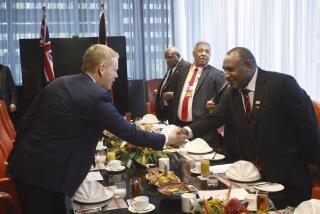U.S. Rejects Call to Repair N. Zealand Ties : Foreign Policy: Baker and Cheney rebuff Australia’s plea to make amends. They say the Wellington government’s anti-nuclear stand remains the obstacle.
- Share via
SYDNEY, Australia — Secretary of State James A. Baker III and Secretary of Defense Dick Cheney, reaffirming the U.S. strategy of nuclear deterrence, today rebuffed an Australian call for a resumption of close political and military ties with New Zealand.
Speaking at a press conference at the conclusion of two days of U.S.-Australia defense cooperation talks, Baker said that the Wellington government’s continued refusal to permit U.S. nuclear-armed or nuclear-powered ships to call at New Zealand ports undermined basic U.S. defense strategy.
He said that Washington would not “establish a separate policy” that would permit New Zealand to resume its alliance with the United States while maintaining its nuclear ban.
Added Cheney: “The peace and security of the free world for more than 40 years now has depended on our strategy of nuclear deterrence. We have provided a nuclear umbrella for the entire free world.”
Australian officials said Foreign Minister Gareth Evans told Baker and Cheney that it was time for Washington to consider repairing the relationship with New Zealand that was downgraded three years ago.
Australia is New Zealand’s closest ally, but the Canberra government supported Washington’s decision in 1986 to end its defense ties with New Zealand.
In a communique, the United States and Australia said the strategic picture in the South Pacific is changing but added, “A reduction of tensions between the superpowers would not automatically produce a more tranquil region.”
New Zealand Prime Minister Geoffrey Palmer has reaffirmed his nation’s anti-nuclear policy. Still, he complained that President Bush is prepared to meet with Soviet President Mikhail S. Gorbachev yet retains a policy that prohibits high-level political and military contacts with New Zealand, one of Washington’s oldest allies.
A U.S. official said: “We live in an age where the United States plays an important role in terms of deterrent capabilities around the globe. Those in part depend on our ability to project force with our Navy. Our Navy relies in part on nuclear propulsion as well as nuclear weapons.”
The disagreement over New Zealand, combined with a rift over Washington’s continued coolness toward an Australian-backed South Pacific nuclear-free zone, marred otherwise harmonious U.S.-Australia security talks at a naval base in Sydney.
Baker, Cheney, Evans and Australian Defense Minister Kim Beazley attended the annual meeting to formulate policy for the alliance that is still known as ANZUS--for Australia, New Zealand, United States--despite New Zealand’s suspension in 1986.
Australian officials said they had got “the very strong impression” that the United States would abstain from a U.N. General Assembly vote endorsing the recently signed compact that prohibits the stationing of nuclear weapons in the South Pacific, although the agreement does not ban passage through the region of nuclear-armed ships flying the flag of outside nations.
“We like it,” an Australian official said of a U.S. abstention in the United Nations. “We like it a lot more than if they voted no.”
However, U.S. officials said that no decision has been made concerning Washington’s position on the U.N. vote. But they left little doubt that the United States opposes creation of nuclear-free zones anywhere in the world.
One official said that U.S. policy on nuclear-free zones has been under review since Bush took office. But he said it is not likely that the Administration will change the position first taken by the Ronald Reagan Administration that “nuclear-free zones are unhelpful.”
More to Read
Sign up for Essential California
The most important California stories and recommendations in your inbox every morning.
You may occasionally receive promotional content from the Los Angeles Times.










